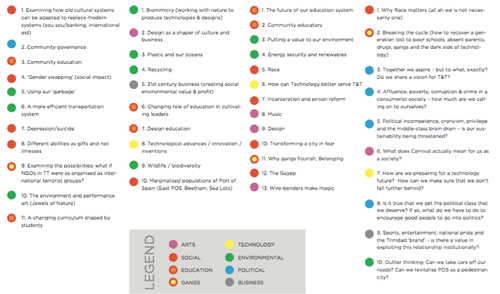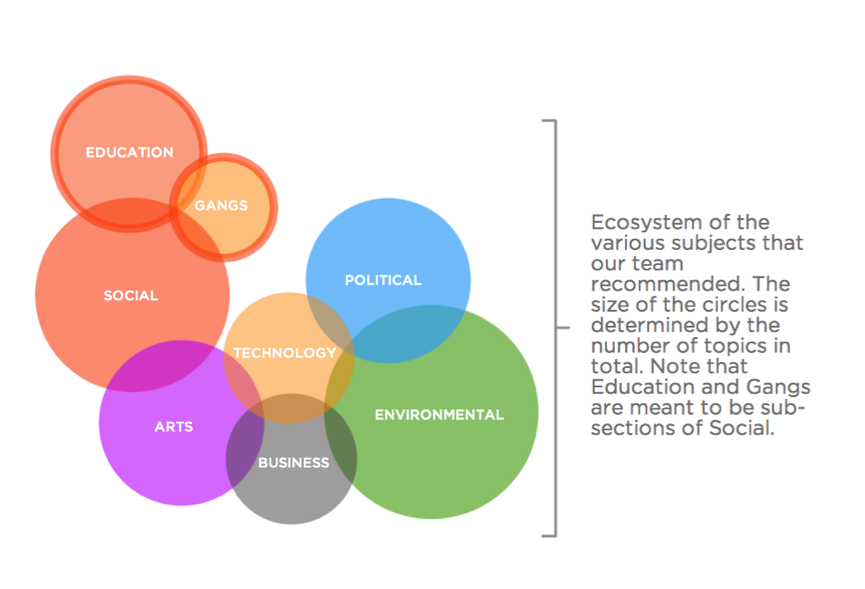The Big Picture: Insights Into How TEDxPortofSpain Selects Speakers
For TEDxPortofSpain 2015, we brought ‘off stage’ conversations onto the stage with our theme “Off Record“. Off Record refers to conversations not intended to be shared publicly. They are the kinds of conversations that are often considered to be too “sensitive”. Conversations that we are too afraid to have or that we save for later. Over the past five years, TEDxPortofSpain has been a platform for ideas worth spreading, for information to be shared and acted upon, starting with our speakers, their topics and extending beyond the stage.Information has been described as the new “oil” – a resource to be extracted and distributed in order to fuel development, encourage growth, create profit – but some call it the new “soil, not oil” (David McCandless), a fertile and regenerative resource, which transforms what is planted and brings forth new possibilities, nurturing thriving cultures. Resources such as information and ideas are playing a larger and emerging role in our economy. For TEDxPortofSpain’s 5th anniversary, we dared ourselves to look at the ideas and topics that seemed unanswered, unresolved or unspoken.
In 2014, we brought to the fore the ideas that we longed to hear about, to talk about in the context of our country. Things like missing populations, the imprisoned, ostracized members of society, business leaders that push the boundaries of human definitions. We had to change our own mindsets, and tried different techniques to get to the heart of these ideas.
After meeting and sharing these ideas and topics, they were then mapped into an infographic, to get a better understanding of the ecosystem of the topics. As it turned out, because so many of our most prominent issues as a society are social, a lot of the topics and speakers have been social. The areas of focus were then mapped for individual speakers, not so much as a guide but to provide a larger context for the information being shared, the bigger conversation.
While the analysis may not be new, the difference here is design, and the manner in which the facts are contextualized.
Some of the first Designers known for mapping information and data, such as David McCandless of Information is Beautiful, have commented on the fact that in the twenty first century, “we are all suffering from information overload”. Making information beautiful through design makes it more digestible, yes, but it also takes us from reading data to more meaningful interaction with it. He has likened the world we live in today as being a landscape of information, and the infographics he designs as being like roadmaps.
The data we mapped for TEDxPortofSpain speaker topics brought to the fore some of the most pressing issues in Trinidad and Tobago. The beauty of information being disseminated lies in the bare truth of it, and the ability of it to become a facilitator of new problem-solving ideas, action and development.
As David puts it, “In this connected age, you have to connect all the different numbers and sets of numbers; only then can you allow the data set to change your mindset.”
By Giselle Carr – TEDxPortofSpain Volunteer on the Speaker Team





I noticed that you do not have a topic area for “Religion” in you ecosystem diagram. There are a lot of issues in this area to be explored in this changing landscape, as more and more Trini’s no longer find meaning in organised religion (the “Nones”). At times, some religious people ‘hide behind their God’ to hurt others with problems of discrimination against the LGBT community, feminist issues, child marriage, child indoctrination (now against UN guidelines), euthanasia, corporal punishment, pro-birth (not pro-life, as many also believe in capital punishment), lack of separation of church and state, and many other topics where they try to impose their beliefs on others in what is said to be a secular state, where ‘every creed and race does not necessarily find an equal place.’